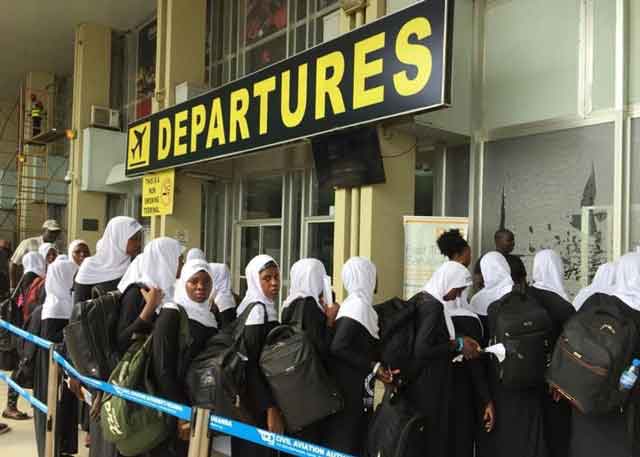
Entebbe, Uganda | THE INDEPENDENT | Some of the Ugandan migrant workers deported from Saudi Arabia blame their woes on mistreatment, long working hours, and non-payment. On October 3, 2021, over 43 migrant workers were deported from Saudi Arabia via Entebbe International Airport.
Mark Ssengondo and another domestic worker who spoke on condition of anonymity were among the deportees. They however told our reporter at the time that they were still in shock and needed time to recover before they could explain why they were deported.
Ssengondo, who left Uganda four years ago, says that he was initially contracted to work as a cleaner in a hotel. He, however, says that when his first two-year contract expired he was hired by another Arab to do the same job at his home.
“But this man started involving me in his building projects and soon I was working as a cleaner at his home and builder at various sites, “Ssengondo said. He said that sometimes he was contracted to work during the day. “But when he started taking me to his building projects, he would sometimes make me work up to 9 pm.”
Ssengondo says he juggled both jobs for one year and eleven months. “Hell broke loose after he had made me work until 3 am and I complained one day.” He said. He explains that says employers in Saudi Arabia disagree with employees over complaints such as long working hours and delayed payment among others.
Another deportee who was working as a domestic worker accuses her employer of being rude and harsh. “She even poisoned me with food and locked me up in a room for eight months.” The deportee, aged 24 years, says she was only rescued by neighbors who heard her screaming in pain one afternoon.
She says her woes started when she demanded payment of her salary arrears of six months. To date, her employer has never paid the arrears.
Zaina Namisi shares a similar story of being poisoned after demanding payment of arrears. Namisi departed for Saudi Arabia on April 17th, 2021 to work as a domestic worker. Two days later, she started working in Jizan.
She however fell out with her employer for failing to pay her salary for a period of four months. She was supposed to earn Shillings 900,000 per month.
Namisi says her employer took her to the foreign recruitment agency that had liaised with Alruwwad Company Ltd that is licensed in Uganda. “She dumped me at that office without paying my money.”
She says she was later taken to an accommodation facility in Hail, which is 1,550 kilometres from Jizan as a freelance domestic worker. She found four other Ugandans who had also previously fallen out with their employers and were now being deployed to work at different homes daily. Namisi says that some of the girls bought her medication and nursed her when she had just been brought from Jizan. She explains that after a month of working under the new arrangement, all the girls realized that they were not being paid. They started complaining and were locked up in the facility until one of the girls escaped and informed the police.”
The police intervened and three girls were evacuated. Namisi says she remained with one Dorothy Namono at the facility until early October when they were deported.
The deportees say it is difficult to fight for one’s rights abroad. Ssengondo and Namisi say that the Ugandan labor export companies tried in vain to ensure they are paid on time.
“I want them to ensure my former boss pays my money. I need that money for treatment,” Namisi says. Ssengondo on the other hand is looking for opportunities in the United Arab Emirates or Oman. “When you fail in one place, it does not mean others will not work out, “he says. Amidst stories of mistreatment, harassment, and exploitation among returnees and deportees, the number of Ugandans leaving for work abroad is on the increase.
It is estimated that an average of 300 to 500 Ugandan migrant workers left the country daily for work abroad between January to May this year. They went mainly to Saudi Arabia, United Arab Emirates-UAE, and Oman. In August alone, 13,000 Ugandans, mainly domestic workers left for work in mainly the Middle East.
Following complaints of human rights abuses and poor working terms and conditions, the Ministry of Gender, Labour and Social Development wants to tighten its grip on external labor export companies with new regulations.
“The Employment (Recruitment of Ugandan migrant workers) Regulations 2021 Statutory Instrument 47 of 2021”, seeks to among others revoke the Employment (Recruitment of Ugandan migrant Workers Abroad) Regulations, 2005, Statutory Instrument 62 of 2005, upholding the dignity and rights of migrant workers by prescribing the appropriate terms and conditions of their employment and providing mechanisms for regulating activities of companies and their agents.
****
URN
 The Independent Uganda: You get the Truth we Pay the Price
The Independent Uganda: You get the Truth we Pay the Price




There should be transparency in labour exportation.
Securing the future of Ugandans, one slave at a time in Arabs world